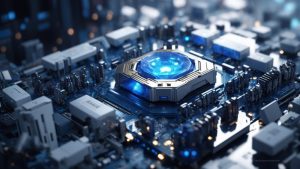Introduction
In the fast‑paced world of technology, quantum computing stands out as one of the most exciting and challenging fields. Imagine a computer that can solve problems in seconds that would take a traditional computer years. It has the potential to revolutionize industries ranging from healthcare to finance. In 2025, It is no longer just a theoretical concept; it’s becoming a practical tool that is starting to make a real-world impact. This article explores the quantum computing breakthroughs in 2025, what they mean for the future, and how businesses and individuals can get involved.
What is Quantum Computing?
Quantum computing is based on the principles of quantum mechanics, the science that explains how very small particles, like atoms and photons, behave. Traditional computers use bits, which can either be 0 or 1. In contrast, It use qubits, which can be both 0 and 1 at the same time, thanks to a property called superposition. This ability to exist in multiple states allows this to process enormous amounts of data much faster than classical computers.
Another important feature of quantum computing is entanglement, where qubits become linked in a way that the state of one qubit can instantly affect the state of another, no matter how far apart they are. These two principles, superposition and entanglement, make quantum computers incredibly powerful and capable of solving complex problems that classical computers cannot.
The State of Quantum Computing in 2025

It has made remarkable strides in recent years, and in 2025, it is becoming more accessible and practical for a wider range of industries. Here are some of the key breakthroughs and trends that define quantum computing in 2025:
1. Quantum Advantage: Solving Real-World Problems
In 2025, we are starting to see quantum computers achieve quantum advantage. This is the point at which quantum computers can solve specific problems faster than classical computers. For instance, in fields like cryptography, quantum computers can potentially break encryption methods that have long been considered secure. This opens up new challenges and opportunities in cybersecurity.
Quantum advantage also extends to industries like drug discovery, where quantum computers are used to simulate molecular interactions, something that classical computers struggle with. This could lead to faster development of life-saving drugs.
2. Quantum Cloud Services: Democratizing Access
In the past, quantum computers were largely confined to research labs, but now companies are offering quantum cloud services. In 2025, businesses and developers can access quantum computers remotely, much like using cloud computing today. Providers like IBM, Google, and Amazon have already made this accessible through their cloud platforms, allowing anyone with the right knowledge to experiment and develop quantum algorithms.
This accessibility is crucial for the advancement of quantum computing, as it allows smaller companies and independent developers to explore quantum technologies without needing to invest in expensive hardware.
3. Advancements in Quantum Hardware
The hardware that powers quantum computers has seen significant improvements. In 2025, companies are moving towards building more stable and scalable quantum systems. One of the biggest challenges has been maintaining the coherence of qubits—since quantum computers are highly sensitive to external disturbances, even the smallest change can lead to errors. However, breakthroughs in materials and cooling technologies have allowed researchers to build more reliable and efficient quantum processors.
For example, IBM’s Eagle quantum processor, which has 127 qubits, has already shown promising results. The push towards higher qubit counts and longer coherence times is expected to continue in 2025 and beyond.
4. Quantum Algorithms and Software
While quantum hardware has improved, the development of quantum algorithms is equally important. Quantum algorithms are the software that drives quantum computers, and they are needed to make the most of the quantum advantage. In 2025, there has been significant progress in developing algorithms for quantum error correction, optimization problems, and machine learning.
The rise of quantum programming languages like Qiskit (from IBM) and Cirq (from Google) is also helping developers build and test quantum algorithms. These languages are designed to make it easier to create and run quantum programs on quantum computers, opening up the field to a wider pool of developers.
5. Quantum Cryptography: Securing the Future
As quantum computers get more powerful, the field of quantum cryptography is growing in importance. Quantum computers could potentially break the encryption systems that protect sensitive data today, such as RSA encryption. To counter this threat, researchers are developing quantum-resistant algorithms, also known as post-quantum cryptography.
In 2025, governments and organizations around the world are beginning to implement quantum-safe cryptography systems to prepare for the age of quantum computers. This will ensure that even with the advent of quantum computers, our digital infrastructure remains secure.
6. Improved Quantum Hardware
One of the biggest challenges in quantum computing has been creating stable and reliable qubits. In 2025, companies like IBM, Google, and Honeywell are making significant strides in hardware development. Quantum computers are becoming more stable, scalable, and capable of performing more complex calculations.
For example, IBM’s Eagle processor and Google’s Sycamore processor have already demonstrated the potential for quantum supremacy—the point at which quantum computers outperform classical supercomputers in certain tasks. However, ongoing improvements in qubit coherence times and error correction methods are making these machines even more reliable for real-world applications.
Key Features:
- Enhanced qubit stability
- More scalable quantum processors
- Improved error correction algorithms
- Longer coherence times
These advancements will not only boost computational power but also make quantum computers more practical for industries like finance, pharmaceuticals, and materials science.
Industries That Will Be Transformed by Quantum Computing in 2025

Quantum computing isn’t just a tool for researchers or tech giants; it has the potential to disrupt a variety of industries. Here are some of the industries that are set to be revolutionized by quantum breakthroughs in 2025:
1. Healthcare and Pharmaceuticals
Quantum computing can simulate complex biological molecules and predict how they interact with each other. This has the potential to speed up drug discovery significantly. For example, the development of treatments for diseases like cancer or Alzheimer’s could become much faster and more precise. Companies are already using quantum computers to simulate molecular interactions and design new drugs in ways that were previously impossible.
2. Finance
In finance, quantum computers can be used to optimize portfolios, calculate risk, and analyze financial markets in real-time. For example, quantum algorithms can process large amounts of data to predict stock market movements or calculate the optimal investment strategy. These capabilities can give financial institutions an edge in making quicker, more informed decisions.
3. Logistics and Supply Chain Management
Quantum computing can be used to solve complex logistics problems, such as optimizing supply chain routes or managing inventory. Traditional computers struggle to calculate the most efficient route when dealing with large numbers of variables, but quantum algorithms can handle these calculations much more efficiently, leading to cost savings and faster delivery times.
4. Artificial Intelligence and Machine Learning
AI and machine learning are already revolutionizing industries, and quantum computing is set to take these fields to the next level. Quantum machine learning algorithms can process data much faster than classical algorithms, allowing for more accurate predictions and insights. This could lead to improvements in everything from self-driving cars to personalized medicine.
Challenges in Quantum Computing

Despite the exciting breakthroughs, there are still challenges to overcome before quantum computers can be widely used. Some of the key challenges include:
1. Quantum Error Correction
Quantum computers are incredibly sensitive to their environment. Even slight changes in temperature, magnetic fields, or other external factors can disrupt calculations. Researchers are working on quantum error correction techniques, but there’s still work to be done to make quantum systems more stable and reliable.
2. Scalability
Building quantum computers with more qubits that can still maintain high coherence is a huge challenge. Currently, many quantum computers have only a small number of qubits, and it will take time to scale them up to the levels needed to solve complex real-world problems.
3. Cost
Building and maintaining quantum computers is expensive. Specialized equipment, such as cryogenic cooling systems, is required to keep the qubits stable. As quantum technology becomes more mainstream, costs are expected to come down, but for now, the price can be a barrier for many businesses.
Conclusion
Quantum computing is no longer just a concept for the future—it’s happening now. In 2025, quantum computers are becoming more practical, accessible, and powerful. From healthcare and finance to logistics and AI, industries are starting to see the benefits of quantum breakthroughs. While there are still challenges to overcome, the potential for quantum computing is enormous. As technology continues to evolve, we can expect even greater advancements that will shape the future of computing and change the way we solve some of the world’s most complex problems.
Call‑to‑Action
Are you ready to explore the world of quantum computing? Start by following quantum news, joining webinars, or even experimenting with quantum programming languages like Qiskit. The future is bright, and quantum computing will be a key part of it. Get involved today!











